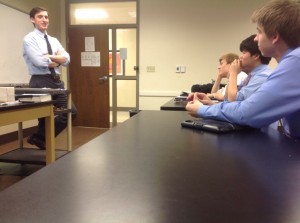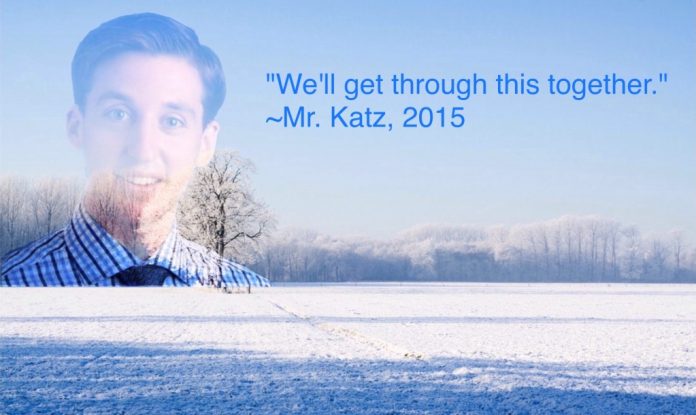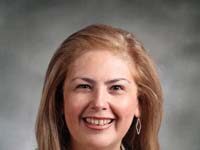“One of the best parts is that I get to work and interact with you guys on a daily basis. It’s vivifying.” Mr. Andrew Katz summed up his opinion of his Jesuit teaching career as he prepared to leave the school to pursue his Ph.D. in engineering and education. Mr. Katz’s teaching experience has been dedicated to helping high school students be the best they can be. But Mr. Katz’s Jesuit experience did not begin one and a half years ago when he began teaching science; it began in the fall of 2001 as a Jesuit freshman trying to succeed in a new high school environment. Since then, he has overcome numerous challenges, always striving to fit the Profile of the Graduate, making him the ideal teacher to instill a hard work ethic and the Men for Others mentality in his students.
With the experience of a Jesuit teacher and student, Mr. Katz now recognizes the similarities between the challenges of a modern-day student and the challenges he faced in high school. “Whether it be an academic challenge, athletic challenge, or a social challenge, I definitely see all those,” he reflected. Although he wished to steer his students away from the same challenges he faced and prevent them from making mistakes, Mr. Katz believed that “at the end of the day, you have to make those mistakes yourself, and it’s my only hope that you get a chance to make those mistakes and learn from them.” He believes that making mistakes is an important part of high school because it offers wisdom and experience to students before they are on their own in college.
Mr. Katz also faced unique challenges in high school, such as when his dad got sick during his sophomore year. He remembered, “I ended up having to take care of a lot of responsibilities, whether it was cooking, cleaning, laundry, or yard work. All of that I became really proficient at before going away to school.” Mr. Katz joked, “Going to college felt like a vacation from half the responsibilities I had back at home!”
After graduating in 2005, Mr. Katz felt he had a good understanding of the six traits of the Profile of the Graduate in his own life. Some, such as Open to Growth, caught on quickly, while others developed with experience during his four years as a student. “I always appreciated Intellectually Competent and Physically Fit,” says Mr. Katz, “I enjoyed cross country and track, so I stuck with that.” However, he had special motivation for Intellectually Competent: “It was always clear to me that if I wanted to get a scholarship to college, it would have to be through academics.” His goal of earning an academic scholarship pushed him to try his hardest, teaching him the value of striving for this component.
He learned the other traits later on: “[I learned to be] open to growth freshman year, but it was probably sophomore year when I started to appreciate being more religious and loving. Being committed to working for social justice probably didn’t actually catch until junior year.” As high school progressed, he increasingly embraced the Profile of the Graduate, allowing him to achieve remarkable goals.
Throughout high school, Mr. Katz put immense effort into earning an academic scholarship to college. “So much of what I was doing in high school was geared toward college, figuring out how to get in, where to go, what to study, how to pay for it, that sort of thing. So the day I found out that I had gotten a full academic scholarship to Tulane was probably one of my biggest accomplishments, just because that’s what I spent so much time working towards.” He appreciated his scholarship because “it opened opportunities, and it allowed me to go about undergraduate studies without worrying too much about finances and stuff like that.”
With a full ride to Tulane University, Mr. Katz encountered a challenge some high school students could not even dream of having: “You go to college, you’ve got class maybe four hours a day, and the rest of that time is just yours to use however you see fit.” Mr. Katz cautioned, “It can hurt you if you’re not on yourself about how you’re using it. Let’s say you’re watching this movie for the eighth time, alright, you could argue that’s a waste of time. With that freedom, you have to be pretty responsible, otherwise you’re going to get yourself into trouble.”
After undergraduate studies at Tulane and graduate school at the University of North Carolina, Mr. Katz moved back to Dallas during the summer of 2013. He recalled, “I met with Mr. Donahue just to catch up and have lunch, and then, a couple months later, when I was working for a tutoring company, Mr. Donahue contacted me, asking if I would be interested in shadowing Mr. Rowley to see about maybe taking over for him in the spring of 2014. Then, [Mr. Rowley] had his health issues, and so I ended up taking over a little earlier than I originally anticipated.”
 Mr. Katz began teaching Mr. Rowley’s science classes, finishing the 2013-2014 school year. The next year, he began his first full year of teaching regulars and AP physics classes, once again joining the Dallas Jesuit community. Explaining his move to teach back at Jesuit, he revealed, “I always felt comfortable in the classroom. I enjoy being sufficiently competent in the subject to be able to teach it to other people, and I enjoy talking about math and science all day.”
Mr. Katz began teaching Mr. Rowley’s science classes, finishing the 2013-2014 school year. The next year, he began his first full year of teaching regulars and AP physics classes, once again joining the Dallas Jesuit community. Explaining his move to teach back at Jesuit, he revealed, “I always felt comfortable in the classroom. I enjoy being sufficiently competent in the subject to be able to teach it to other people, and I enjoy talking about math and science all day.”
When comparing the job of teaching at Jesuit tothe role of a student, Mr. Katz examined, “In some respects it’s similar in that you have somewhat similar schedules. If it’s cross country season, there’s practice before and after school, and then you have classes all day, you have stuff you have to do in the evening, for you all it’s homework, for me it’s lesson planning and grading. The difference is I get to be on my feet all day and you all have to sit on your butts all day.” Upon further examination, he analyzed that “it’s interesting dictating the pace of the class, rather than just being along for the ride.”
Teaching a physics class is not easy, though. When asked about the challenges of teaching, Mr. Katz chuckled, “How much time do we have?” He proceeded to elaborate on the “general challenges” of “making sure everyone’s coming along, and on the same page, and getting to where they need to be.” Next, he mentioned the “specific challenges,” such as “individuals, or classroom management, or, you know, individual personality issues.” Finally, “there’s the sort of broader, existential crisis.” Among Mr. Katz’s traits of the Profile of the Graduate lies a proficiency for subtle sarcasm. As for iPads, “I swear, some jokers need to just not be allowed to use those, ever.”
Mr. Katz likens his job as a teacher to a conductor of a symphony to explain his style of leading the class. “Everyone plays a note, but it’s the conductor’s job to make sure that all the musicians are playing the right notes, and are all doing their parts. You could argue that it’s the same for a teacher in that I’m not taking the tests, but it’s my job to make sure that you guys are in a place where you can do that.” Harry Smith ‘16, for example, commended Mr. Katz’s teaching style, remarking, “His tongue-in-cheek humor and constant interactions with the students made me interested in physics, and his extensive knowledge and willingness to help improved my ability.”
Other challenges of the 2014-2015 school year included a malfunctioning e-textbook and multiple snowdays. At the beginning of the year, students in Mr. Katz’s AP Physics 1 class had problems viewing their textbook, College Physics (High School Edition), on their iPads. Mr. Katz overcame the “technologically suboptimal eBook” by finding another textbook online, encouraging his students to read it by promising “more reading quizzes.” Several snowdays at the beginning of the second semester also hindered Mr. Katz from carrying out his lesson plan. After assigning his students work to make up during the “iDay,” Mr. Katz explained, “Sometimes life throws curveballs at you,” but encouraged, “We’ll get through this together.” Even on a snowday, Mr. Katz made sure his students stayed on track with school, demonstrating his devotion and care for his students, no matter the obstacle.
As a Jesuit graduate and teacher, Mr. Katz continues to strive to exemplify the Profile of the Graduate. He explained, “I am always working on it. There’s always room for improvement. I use [the Profile] to guide me on how I live my life and make my life choices. Those six areas cover a lot of how someone should be, and if you’ve gotten them covered, to some extent, then you’re doing a pretty good job of being a decent human being.”
Mr. Katz believes that his time at Jesuit, as a student and teacher, has made him grow as a person into a smarter, stronger human being. For example, “being in front of groups of people and talking used to be a bit of an issue,” but project presentations as a student and teaching experience has helped him overcome it. “In terms of just time management and planning, that’s helped. Growing as a teacher, knowing what works and doesn’t work, when to do things and not do things, [my Jesuit experience] has been hugely helpful. I’ve grown through the entire process.”
Mr. Katz views the completion of his first full year of teaching not as a personal accomplishment, but as a “privilege.” He has been honored “to work with the students that I do work with. It’s been pretty exciting.” Mr. Katz’s view of his job as a privilege rather than a responsibility reveals his humble attitude of his effect on his students: “To think that- admitting that there’s a fair amount of hubris in this- to think that I didn’t hurt anyone’s academic progress, that, to me, is an accomplishment. And then the further prospect that I might have even helped to advance someone’s academic progress is the biggest [accomplishment] to me.” Although he has worked at Jesuit for a year and a half, continually teaching students the value and usefulness of science, Mr. Katz maintains his humble nature, downplaying his effect on his students, despite the obvious beneficial impact he has had while teaching. Joseph Buehler ’16, one of his physics students, agrees, “He was a very good teacher. He made a real impact in his students’ lives.”
As Mr. Katz travels to Virginia Polytechnic Institute to pursue his Ph.D. in engineering and education, his goal is “to positively impact science and engineering education. Whether that’s at the high school level, or the college level, is ultimately of minimal consequence to me, but the goal is to maximize the extent to which I can have that impact. It’s super lofty, but you have to have some sort of goal like that.” He believes studying engineering and education will help him achieve that goal because “[those] programs typically focus on this goal of ‘How do you educate engineering students better?’”
As for coming back to Jesuit, Mr. Katz stated, “I am certainly open to the idea.” The Jesuit community would certainly love to have him back. After only a year and a half of teaching, Jesuit students and faculty have grown to love him for his selfless attitude and dedication. His humor and humility are a welcome part of everyone’s day, and his presence will be missed; however, Mr. Katz has already made one return to Jesuit, so who can say he will not be back again?







